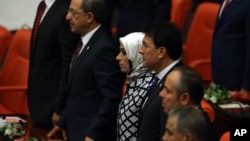Turkey's parliament reconvened Tuesday with a swearing-in ceremony for the newly-elected deputies following the June 7 general election.
Although the Justice and Development Party, or AKP, lost its parliamentary majority, President Recep Tayyip Erdogan is expected to give AKP leader Ahmet Davutoglu a mandate to form a coalition government. With a civil war raging next door in Syria and economic concerns growing inside the country, Turkey's two largest parties are under pressure to work together.
Media speculation is growing that AKP, which remains the largest party in parliament, may already have struck a deal with the far-right Nationalist Action Party, or MHP.
Yuksel Taskin, a political scientist at Istanbul’s Marmara University, says such a coalition would be the easiest to put together, given that the two parties have similar constituents.
"The most possible outcome would be [an] AKP and MHP Nationalist Action Party coalition. Either [a] coalition or a minority government by AKP supported by MHP," said Taskin.
However, the MHP remains firmly opposed to continuing peace talks with the Kurdish rebel group PKK. Analysts warn that ending those peace efforts could plunge the county back into armed conflict, or at least spark social unrest, which would deal another blow to the country’s fragile economy. Such a prospect has seen opinion formers, some parts of the media, and business leaders call for a grand coalition between the AKP and the main opposition center-left Republican People’s Party, or CHP.
Kadri Gursel, a political columnist for Milliyet newspaper and Al-Monitor website, says there are powerful reasons behind the growing calls for a “grand coalition.”
"Any coalition between CHP and AKP will have a bigger social base and it will ease the tensions in the country," he said. "And this coalition will also limit the power of Mr. Erdogan. The president will not be able anymore [to] impose his will and power on the AKP. [An] AKP-CHP coalition ... will create a chance for [the] AKP to renew itself, reform itself."
‘Chaotic period’ ahead
But significant obstacles to forming a coalition remain: the parties are ferocious ideological rivals, with AKP having Islamist roots and the CHP being the party of Mustafa Kemal Ataturk, founder of the secular Turkish state. Although the CHP has started to downplay its secular roots, its allegations of corruption at work within ranks of AKP legislators and officials remains a major stumbling block.
In December 2013, Turkey's then-AKP government was hit by major graft investigations implicating senior ministers and their families, including Erdogan, who was prime minister. But the probes were shut down, with AKP denouncing them as an attempted “judicial coup.”
Political scientist Cengiz Aktar of Istanbul’s Suleyman Sah University warns that corruption allegations threaten any future government involving AKP.
"Turkey is certainly heading towards a chaotic period in terms of the creation of the government, because Turkey will have extreme difficulties to have a powerful government if this government does not clean the big files that are waiting there to be cleaned," he said. "Especially the probes of December 2013."
The controversy over alleged corruption erupted again last week, when a Turkey-based Iranian businessman, Reza Zarrab, received an exporter-of-the-year award. Zarrab was at the center of the 2013 investigations into alleged AKP graft. The businessmen received the award from Deputy Prime Minister Numan Kurtulmus, a senior AKP member, with President Erdogan in attendance. The award, and the fact that senior AKP members attended the ceremony, drew angry condemnation from opposition parties.
Columnist Gursel says the political row underscores how difficult it will be for the CHP to form a coalition with the AKP.
"They are not eager to have a coalition with AKP, because they know AKP is like a toxic political entity," says Gursel.
CHP leader Kemal Kilicdaroglu has been working hard to build a coalition without the AKP, or to form a minority government. But the MHP, which would be key to such hopes, has thus far ruled out supporting such a move.
AKP leader Davutoglu has also shown reluctance to enter into a coalition with the CHP. But with little enthusiasm for early elections, analysts predict the leaders of the country's two largest parties will come under growing pressure to make a deal.




